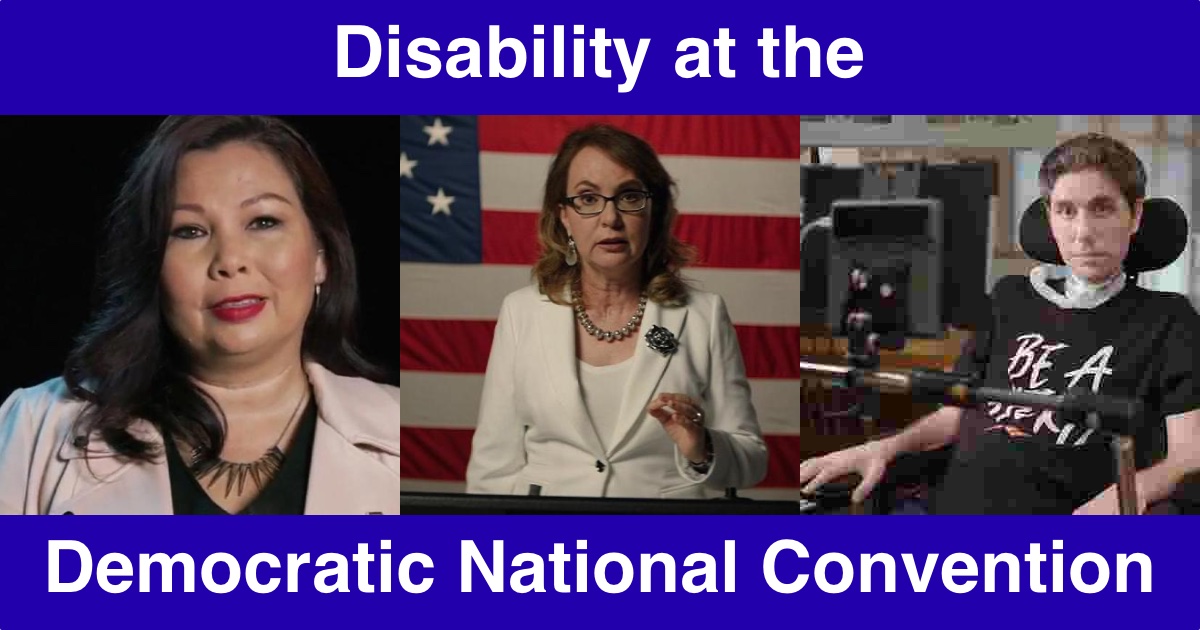Washington, D.C., August 23 – The 2020 Democratic National Convention took place over the course of this week, and several speakers with disabilities were featured over the first-of-its-kind virtual event. By doing so, the event helped to normalize disability, showing individuals with a variety of disabilities speaking about topics from gun violence to healthcare – issues of importance to all people in America. This is a massive change in politics as people with disabilities are starting to be seen and heard.
Indeed, after the 2012 DNC and RNC political conventions, The New York Times created a tool where people could put in a word to see how many times that word appeared from the convention stages during these major events. People with disabilities had been missing from both the stage and the conversation as the tool showed that the word was not even mentioned once per 25,000 words from the Republican convention and was mentioned .03 times per 25,000 times at the 2012 Democratic convention.
The 2020 DNC convention, in contrast, featured both conversations about disability as well as speakers with disabilities.
For example, former Rep. Gabrielle Giffords spoke out about gun violence and expressed the need for hope and determination for progress. “My recovery is a daily fight, but fighting makes me stronger,” said Giffords, who represented Arizona’s 8th congressional district from 2007 to 2012 but was forced to resign due to a severe brain injury sustained in an assassination attempt. “Words once came easily; today I struggle with speech. But I have not lost my voice.”
Illinois Sen. Tammy Duckworth, a former U.S. Army lieutenant colonel, Iraqi War Veteran, Purple Heart Recipient, double amputee and wheelchair user, focused her speech on ensuring better veteran’s affairs. She spoke to the strength of military spouses and parents, as well as the caregivers to disabled servicemembers, and the need to support these individuals as well as our troops.
Another notable speech came from Ady Barkan, a California healthcare activist with ALS who shared an impassioned plea for healthcare for all and the expansion of the Affordable Care Act, especially during the current COVID-19 pandemic. Barkan, as well as others who spoke on the topic of healthcare, made mention of the more than 100 million Americans with preexisting conditions for whom protection is especially critical. Notable about his speech is that millions of Americans watching the DNC viewed his utilization of assistive technology, helping to normalize this method of communication.
Barkan also was featured in a video that kicked off the convention’s final night, in which participants shared where they hope to be this time next year—in a world where Vice President Joe Biden is president. Also featured in this video was Ramp Your Voice Founder Vilissa Thompson, a Black woman with Osteogenesis Imperfecta. During this compilation video, she said she wants a president “who cares about the rights and lives of disabled people.”
Arguably the most notable speech of the final night was delivered by 13-year-old Brayden Harrington, who like Biden, has a stutter. Harrington shared the story of how he met Biden at a February CNN townhall in Concord, New Hampshire, and how Biden took time to speak with him about his own journey to overcome his stutter. “In a short amount of time, Joe Biden made me feel more confident about something that’s bothered me my whole life,” Harrington said.
Jessica Sanchez, a DACA recipient living in North Carolina who was born with spina bifida, highlighted immigration and pathways to citizenship. She spoke of how her mother, Silvia, brought her to the United States in 1996 after Jessica was given only a few months to live by doctors in Mexico.
All of these speakers had visible or known disabilities. The majority of disabilities are nonvisible, so it is possible other speakers may have had disabilities as well. Additionally, many of the speakers have loved ones with disabilities, including Eva Longoria who moderated the first night. Longoria is active on disability issues due to her older sister Liza, who has developmental disabilities.
“With one in five people in America (one-in-four adults) having a disability, it is important that candidates and political parties fully and intentionally include people with disabilities,” said RespectAbility’s Vice President of Communications Lauren Appelbaum, who previously worked as a political researcher for NBC News. “Voters with disabilities want access in democracy, just like anyone else. At the same time, they have specific issues of interest. For example, of the 22 million working age (18-64) people with disabilities in our country, fully 70 percent of them were outside of the labor force pre-COVID-19 pandemic.”
Polling data of the battleground states shows that the disability community is large and electorally contested, but the issues they care about most are not being sufficiently addressed. More than half of the electorate in the battleground (59 percent) self-identifies as having a disability (16 percent), having a family member with a disability (32 percent) or having a close friend with a disability (11 percent).
“The disability community is making major progress, but we still have a long way to go,” said Jennifer Laszlo Mizrahi, president of RespectAbility. “All candidates and campaigns need to be accessible, inclusive and address disability issues. We urge all voters to ask their candidates to answer the Disability Candidate Questionnaire and take a stand on issues that matter.”
The RespectAbility Report, which is nonpartisan, also will be watching the 2020 Republican National Convention for disability representation.

[…] To follow through on this outreach effort, the campaign hired Molly Doris-Pierce, a young woman with obsessive compulsive disorder (OCD), as their National Disability Engagement Director. Since coming onboard, the Biden campaign in June, Ms. Doris-Pierce hosted monthly roundtables on disability issues, including on housing, employment and academic accommodations. Further, in August, speakers with disabilities appeared throughout the virtual programming schedule of the Democratic National Convention. […]